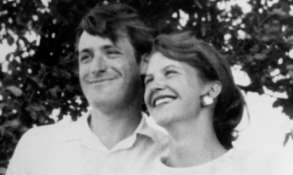|
agonia english v3 |
Agonia.Net | Policy | Mission | Contact | Participate | ||||
|
|
| |||||
| Article Communities Contest Essay Multimedia Personals Poetry Press Prose _QUOTE Screenplay Special | ||||||
 |
|
|||||
|
agonia 
■ Venus and Adonis
Romanian Spell-Checker Contact |

- - -
- - - - - - - - - - - - - - - - - - - - - - 2010-10-07 | |
The following article was published by Maev Kennedy on Wednesday, 6th of October 2010 in The Guardian.
The torment of the poet Ted Hughes over the fate in 1963 of his estranged wife Sylvia Plath, is reflected in his repeated attempts to perfect a poem about the night of her suicide – a previously unknown piece which is now being published. The manuscript was found by Melvyn Bragg in the British Library with the help of Hughes' widow Carol, and is published in Thursday's issue of the New Statesman, which he has guest edited. Last Letter begins, in one of at least three versions in the Hughes archive now in the British Library: "What did happen that Sunday night? / Your last night? Over what I remember of it." A version of the poem was also read tonight by the actor Jonathan Pryce on Channel 4 News, including the agonised lines recalling how a phone call broke the news: "Then a voice like a selected weapon / or a carefully measured injection / coolly delivered its four words deep into my ear / your wife is dead." The magazine reproduces facsimiles of three drafts of the poem, with one entire version completely scored out, and many lines barely decipherable. One abandoned version recalls "my last sight of you alive / burning your last letter to me … yet with that strange smile, as if you had meant something quite [heavily crossed out] different". He seems to have wrestled with the poem for some 30 years, before finally dropping it from his last collection. Lord Bragg described it as the missing keystone of the Birthday Letters sequence of poems addressed to Plath by Hughes. Plath, who battled with depression throughout her life, died by gassing herself aged just 30, seemingly overwhelmed by despair living with two tiny children through a bitterly cold London winter. After 35 years of public silence about her death, during which he was frequently blamed for causing the emotional crisis which precipitated it by leaving her for another woman – who also later killed herself and their child – Hughes finally published the collection in 1998. With painful and often tender intimacy it tracks the arc of their marriage, from the first meeting of the two poets until one written on the 10th anniversary of her death. It proved the year of his own death. He was posthumously awarded the Whitbread Prize for the collection which went on to sell over 500,000 copies worldwide. Hughes' archive of over 200 boxes of manuscripts, letters, diaries and journals was bought two years ago by the British Library for £500,000. In his introduction to the poem, Bragg writes that he regards Birthday Letters as Hughes' finest achievement: "It is a privilege to present a hitherto unpublished but crucial poem from that series ... Carol directed me to this specific poem. I know how much Ted's work means to her, and how fiercely and scrupulously she guards it." http://link.brightcove.com/services/player/bcpid601325122001?bctid=627023205001
|
||||||||
|
|
|
|
|
|
|
|
|||
| Home of Literature, Poetry and Culture. Write and enjoy articles, essays, prose, classic poetry and contests. | |||||||||
 |
|
